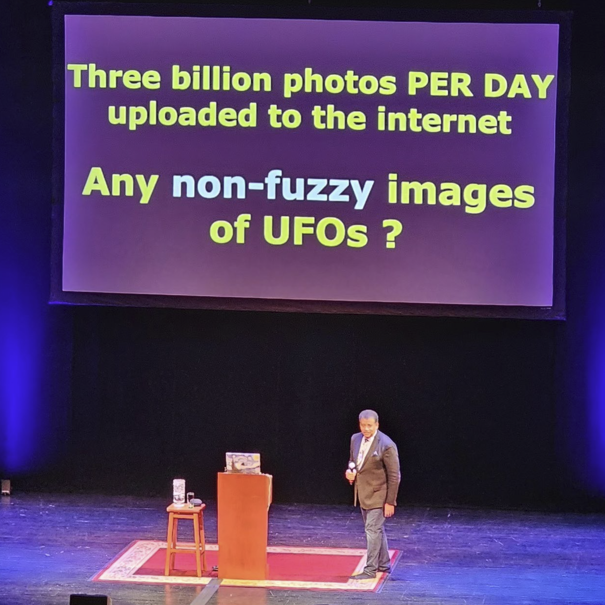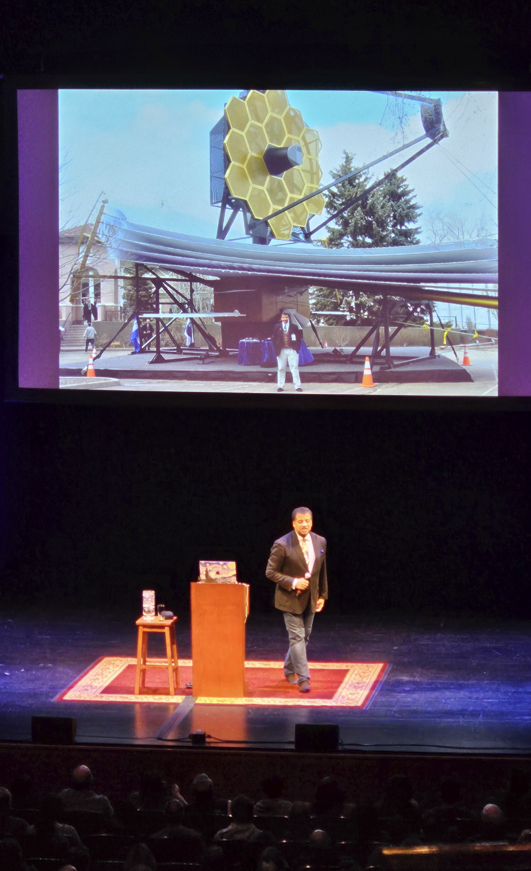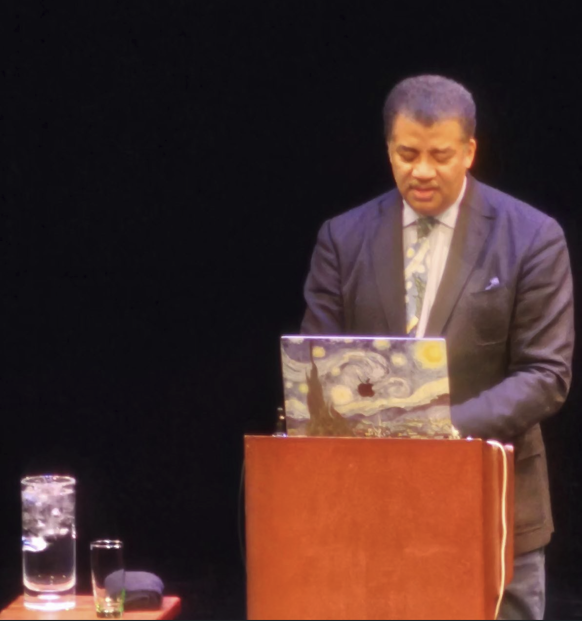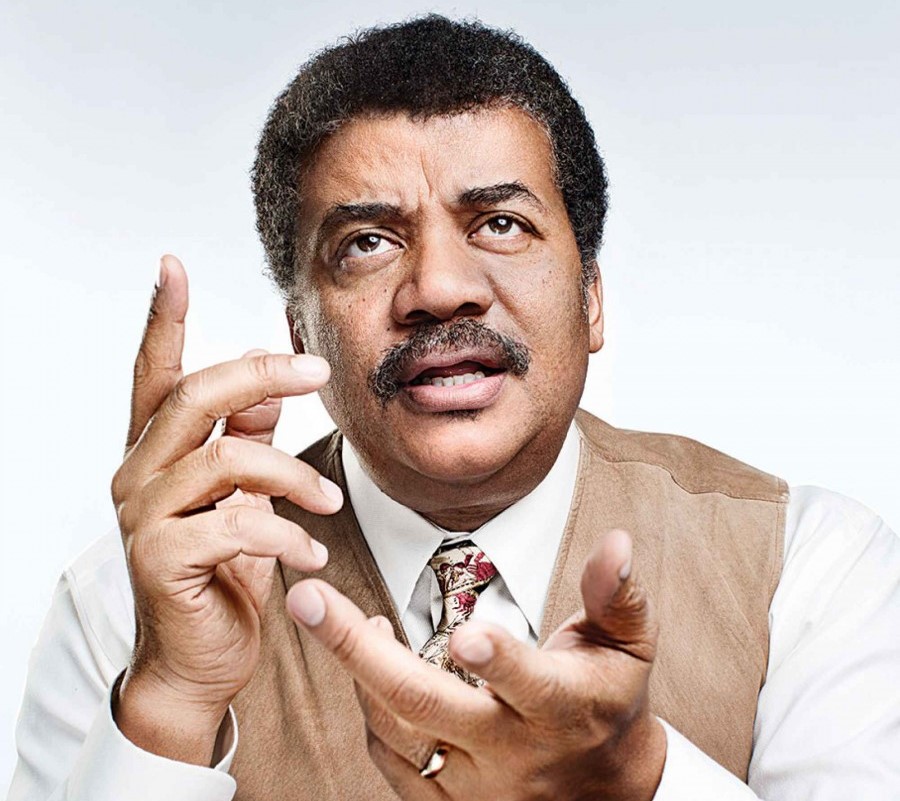by Shah Dabiri
Photo by Marius Bugge



NEWARK, NOV 30 — The New Jersey Performing Arts Center (NJPAC) bore witness to an electrifying cosmic discourse as acclaimed local astrophysicist and nationally recognized man of the Cosmos, Neil deGrasse Tyson took center stage in a sold-out two-hour lecture, captivating attendees with a sweeping exploration of cutting-edge space discoveries and possibilities.
Tyson, known for his adept ability to blend scientific rigor with captivating and joyful storytelling, delved into an array of cosmic phenomena, beginning with the evolution of new super heavy rockets and their transformative potential for space exploration. His insights illuminated the advancements propelling humanity toward ambitious interstellar endeavors.
“Mankind’s leap into the cosmos hinges on our ability to engineer and harness the power of these new super heavy rockets,” Tyson articulated, sparking intrigue among the audience about the future of space travel while showing a video of the Artemis 1 launch which put a uncrewed capsule into lunar orbit.
Transitioning seamlessly, Tyson navigated the terrain of moon missions, shedding light on the resurgence of lunar exploration and its significance in expanding our understanding of celestial bodies. His fervor for scientific exploration resonated as he articulated the scientific and exploratory value inherent in revisiting Earth’s celestial companion and seeking water ice on it’s north and south poles. “This water ice he stated will be critical in our long term stay on the moon for we can split the water into hydrogen and oxygen which we need for air to breathe and rocket fuel to get back home!”
A topic that evoked both curiosity and contemplation was Tyson’s discussion of asteroids and their potential impact on Earth. He delineated the scientific efforts underway to track and understand these cosmic bodies, underscoring the imperative for proactive measures to safeguard our planet from potential threats from space as well as the recent missions into colliding with and recovering material from these ancient bodies.
“Studying asteroids not only unveils the secrets of our solar system’s history but also holds the key to safeguarding Earth’s future,” Tyson remarked, while showing video of OSIRIS-REx Mission which captured and returned a few grams of material to the Earth and the DART which collided with an asteroid pair to see what it would take to “nudge” these massive rocky bodies.
Intrigue peaked as Tyson navigated the frontiers of exoplanets, offering tantalizing glimpses into the search for habitable worlds beyond our solar system. His insights into the quest for exoplanetary discoveries ignited imaginations and underscored the vastness of uncharted cosmic territories.
Amidst discussions of cosmic wonders, Tyson introduced a compelling subject—alien mummies—a concept that spurred a blend of fascination, skepticism and laughter among the audience. Tyson delved into the scientific scrutiny surrounding purported extraterrestrial artifacts, inviting contemplation on the boundaries between scientific inquiry and speculative claims. And reminding the audience to adhere to the scientific principial to peer review and peer scrutiny of any claims. And that if these aliens were real then samples needed to be provided for independent study and review.
The lecture culminated with Tyson’s reflections on Space Force, elucidating the complexities and implications of militarizing space. He emphasized the necessity for international collaboration and ethical considerations, prompting contemplation on the future of humanity’s ventures beyond Earth.
Attendees lauded Tyson’s ability to elucidate intricate cosmic concepts while keeping the audience engaged throughout the journey into the cosmos, even though he’s not a big fan of Pluto….which is not a planet though it may have an atmosphere.
“Tyson’s ability to combine scientific depth with accessible explanations makes the mysteries of space feel within reach,” shared an enthralled attendee, echoing the sentiments of a captivated NJPAC audience.
A touching moment in the show was Tyson’s homage to his recently diseased mother, who at 95 had seen the world change so much so fast and so far, that he was amazed she was able to keep up with it all while wondering and probing the audience to question and wonder what the next 90 years will bring for the rest of society. Noting, “It took us less than 50 years to go from our first flights in wood and cloth to touching the surface of our moon. what will we do and see and touch in the next 50 years?”
As the lights went down on this cosmic odyssey, Tyson left an indelible mark on the audience, fostering a renewed sense of wonder and curiosity about the boundless cosmos that envelops us.


“… recently diseased…” shouldn’t the word be “deceased”